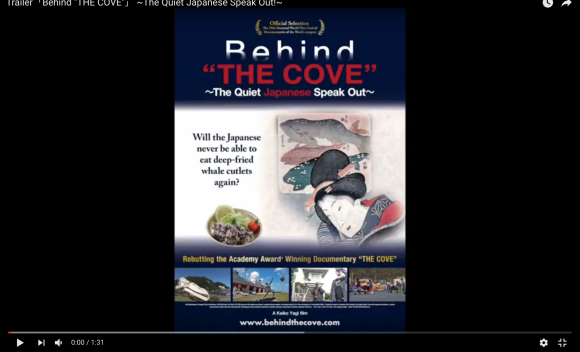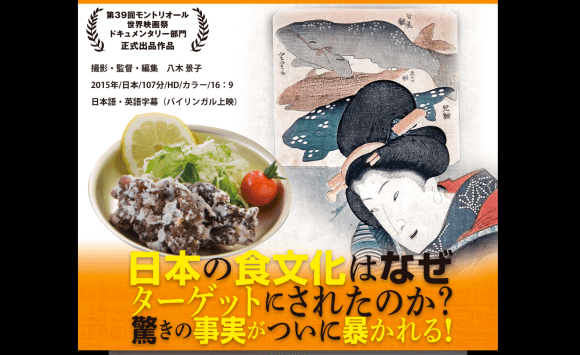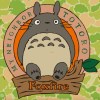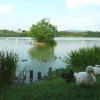
New Japanese film asks, “Who decides which animals are okay to eat and which animals aren’t?”
Behind The Cove: The Quiet Japanese Speak Out was released in the U.S. last month in New York at the Cinema Village, followed by a special screening at the Laemmie Music Hall in Los Angeles.
You can check out the Behind The Cove trailer here:
Film director Keiko Yagi was inspired to create a film rebuking the Academy Awarding winning documentary The Cove, which condemns dolphin hunting and whaling practices in Japan. Yagi set out “to find the truth of the matter on whaling” with no budget, limited filmmaking experience, and no English fluency.
The Cove documentary, which was released in 2009, set in motion global uproar against the practice of whaling and dolphin hunting in Japan. In one instance, the hacker group “Anonymous” brought down Wakayama Prefecture’s website – Wakayama is home to Taiji City where dolphin hunting takes place.
The Behind The Cove official website describes The Cove documentary as a biased production against dolphin hunting and states that many people (presumably Japanese) said the film “wasn’t truthful at all”, “was a dramatized lie”, and “was misleading through the use of hidden cameras and camera technology that changed the color of the sea.”
THIS FRIDAY! Documentary film "Behind the Cove" opening in LA @musichall3. Get your ticket now https://t.co/K6gQrSQIEY #Whaling #documentary pic.twitter.com/f1iWeF2w5d
— behindthecove (@behindthecove) November 28, 2016
Yagi traveled to Taiji Cove, the main sight of The Cove documentary, to investigate the reality of dolphin hunting. The Behind The Cove film delivers the “truth” about the tradition of dolphin hunting through interviews with a range of people directly involved with the practice. The film also features interviews with The Cove director, Louie Psihoyos, and The Cove star and anti-whaling activist, Ric O’Barry.
▼ “Why has Japanese food culture become a target?”
Here are some reactions to the film from audiences in New York:
American male: “I learned of the beauty of the town of Taiji, which I did not see in The Cove.”
Japanese-American female: “I was against whaling, but I now have a slightly different view.”
American male: “It made me think about the nationalism of the United States and other countries, as seen in the recent US election.”
American male: “I always thought Asians looked the same, but in the film their facial expressions were rich, and I could see that they all looked different.”
Japanese male: “I am from the generation that ate whale meat, but as many countries oppose it, I think whaling should be stopped.”
If you’re interested in more of what Keiko Yagi has to say about whaling and dolphin hunting, you can see her talk at a Foreign Correspondent’s Club of Japan press conference here:
We conducted a small survey last year asking five Japanese people what they personally thought about eating whale. The answers were extremely varied and thought-provoking, so check it out for more insight into the topic.
What is your opinion on whaling and dolphin hunting? Do you think a documentary produced by a Japanese national may change your mind?
Source: YOMYOMF, AsAMNews, Behind The Cove
Top image: YouTube/Keiko Yagi
Insert images: Behind The Cove


 8 Japan-related events to look forward to in 2016!
8 Japan-related events to look forward to in 2016! How do people in Japan feel about eating whale? We asked five people for their opinions
How do people in Japan feel about eating whale? We asked five people for their opinions Moby Drink: Iceland creates a beer made with endangered whale bones, can’t sell it
Moby Drink: Iceland creates a beer made with endangered whale bones, can’t sell it Godzilla? Japanese news broadcast reports “giant creature” in Tokyo Harbor
Godzilla? Japanese news broadcast reports “giant creature” in Tokyo Harbor Japan: Guilty Until Proven Innocent documentary shines light on controversial legal system【Video】
Japan: Guilty Until Proven Innocent documentary shines light on controversial legal system【Video】 McDonald’s new Happy Meals offer up cute and practical Sanrio lifestyle goods
McDonald’s new Happy Meals offer up cute and practical Sanrio lifestyle goods All-you-can-drink Starbucks and amazing views part of Tokyo’s new 170 meter-high sky lounge
All-you-can-drink Starbucks and amazing views part of Tokyo’s new 170 meter-high sky lounge More foreign tourists than ever before in history visited Japan last month
More foreign tourists than ever before in history visited Japan last month Starbucks reopens at Shibuya Scramble Crossing with new look and design concept
Starbucks reopens at Shibuya Scramble Crossing with new look and design concept The oldest tunnel in Japan is believed to be haunted, and strange things happen when we go there
The oldest tunnel in Japan is believed to be haunted, and strange things happen when we go there Flying Totoro appears in new Studio Ghibli x Foxfire collection
Flying Totoro appears in new Studio Ghibli x Foxfire collection Is the new Shinkansen Train Desk ticket worth it?
Is the new Shinkansen Train Desk ticket worth it? What happens to Cup Noodle Mystery Meat when you cook it in a rice cooker?
What happens to Cup Noodle Mystery Meat when you cook it in a rice cooker? Beautiful Sailor Moon manhole cover coasters being given out for free by Tokyo tourist center
Beautiful Sailor Moon manhole cover coasters being given out for free by Tokyo tourist center A visit to the best UFO catcher arcade in the universe!
A visit to the best UFO catcher arcade in the universe! Disney princesses get official manga makeovers for Manga Princess Cafe opening in Tokyo
Disney princesses get official manga makeovers for Manga Princess Cafe opening in Tokyo We try out “Chan Ramen”, an underground type of ramen popular in the ramen community
We try out “Chan Ramen”, an underground type of ramen popular in the ramen community Beautiful new Final Fantasy T-shirt collection on the way from Uniqlo【Photos】
Beautiful new Final Fantasy T-shirt collection on the way from Uniqlo【Photos】 Foreign English teachers in Japan pick their favorite Japanese-language phrases【Survey】
Foreign English teachers in Japan pick their favorite Japanese-language phrases【Survey】 There’s a park inside Japan where you can also see Japan inside the park
There’s a park inside Japan where you can also see Japan inside the park Japanese convenience store packs a whole bento into an onigiri rice ball
Japanese convenience store packs a whole bento into an onigiri rice ball Studio Ghibli releases Kiki’s Delivery Service chocolate cake pouches in Japan
Studio Ghibli releases Kiki’s Delivery Service chocolate cake pouches in Japan Japan’s bone-breaking and record-breaking roller coaster is permanently shutting down
Japan’s bone-breaking and record-breaking roller coaster is permanently shutting down New definition of “Japanese whiskey” goes into effect to prevent fakes from fooling overseas buyers
New definition of “Japanese whiskey” goes into effect to prevent fakes from fooling overseas buyers Foreign passenger shoves conductor on one of the last full runs for Japan’s Thunderbird train
Foreign passenger shoves conductor on one of the last full runs for Japan’s Thunderbird train Our Japanese reporter visits Costco in the U.S., finds super American and very Japanese things
Our Japanese reporter visits Costco in the U.S., finds super American and very Japanese things Kyoto bans tourists from geisha alleys in Gion, with fines for those who don’t follow rules
Kyoto bans tourists from geisha alleys in Gion, with fines for those who don’t follow rules Studio Ghibli unveils Mother’s Day gift set that captures the love in My Neighbour Totoro
Studio Ghibli unveils Mother’s Day gift set that captures the love in My Neighbour Totoro Domino’s Japan now sells…pizza ears?
Domino’s Japan now sells…pizza ears? New Japanese KitKat flavour stars Sanrio characters, including Hello Kitty
New Japanese KitKat flavour stars Sanrio characters, including Hello Kitty Sales of Japan’s most convenient train ticket/shopping payment cards suspended indefinitely
Sales of Japan’s most convenient train ticket/shopping payment cards suspended indefinitely Sold-out Studio Ghibli desktop humidifiers are back so Totoro can help you through the dry season
Sold-out Studio Ghibli desktop humidifiers are back so Totoro can help you through the dry season Japanese government to make first change to romanization spelling rules since the 1950s
Japanese government to make first change to romanization spelling rules since the 1950s Ghibli founders Toshio Suzuki and Hayao Miyazaki contribute to Japanese whisky Totoro label design
Ghibli founders Toshio Suzuki and Hayao Miyazaki contribute to Japanese whisky Totoro label design Doraemon found buried at sea as scene from 1993 anime becomes real life【Photos】
Doraemon found buried at sea as scene from 1993 anime becomes real life【Photos】 Tokyo’s most famous Starbucks is closed
Tokyo’s most famous Starbucks is closed One Piece characters’ nationalities revealed, but fans have mixed opinions
One Piece characters’ nationalities revealed, but fans have mixed opinions We asked a Uniqlo employee what four things we should buy and their suggestions didn’t disappoint
We asked a Uniqlo employee what four things we should buy and their suggestions didn’t disappoint Princesses, fruits, and blacksmiths: Study reveals the 30 most unusual family names in Japan
Princesses, fruits, and blacksmiths: Study reveals the 30 most unusual family names in Japan Studio Ghibli’s new desktop Howl’s Moving Castle will take your stationery on an adventure
Studio Ghibli’s new desktop Howl’s Moving Castle will take your stationery on an adventure Queer Japan documentary Kickstarter reaches goal
Queer Japan documentary Kickstarter reaches goal Need a whale-ly cool party idea? Make your own easy and fun banana dolphins! 【DIY】
Need a whale-ly cool party idea? Make your own easy and fun banana dolphins! 【DIY】 Japanese Americans tell STORIES FROM TOHOKU
Japanese Americans tell STORIES FROM TOHOKU Potted plant that grows tiny leaping dolphins is the latest botanical muse to enchant Japan
Potted plant that grows tiny leaping dolphins is the latest botanical muse to enchant Japan Survey reveals that Australian people trust Japan and Prime Minister Abe to act responsibly
Survey reveals that Australian people trust Japan and Prime Minister Abe to act responsibly Pantene ad asks why people in Japan are forced to look the same when job hunting
Pantene ad asks why people in Japan are forced to look the same when job hunting Poll shows most disabled people in Japan dislike “inspirational” documentaries about disability
Poll shows most disabled people in Japan dislike “inspirational” documentaries about disability Tokyo junior high school demands students wear white underwear as part of dress code
Tokyo junior high school demands students wear white underwear as part of dress code Does this goat have better hair than you?
Does this goat have better hair than you? Three Tokyo youths arrested for cork hunting, everyone else learns what cork hunting is
Three Tokyo youths arrested for cork hunting, everyone else learns what cork hunting is The often untold story of cleaning up dead kaiju finally coming to theaters next year
The often untold story of cleaning up dead kaiju finally coming to theaters next year South Korean ferry disaster to be turned into low-budget documentary next year
South Korean ferry disaster to be turned into low-budget documentary next year Toronto Film Festival to host North American premiere of Princess Kaguya, Ghibli documentary
Toronto Film Festival to host North American premiere of Princess Kaguya, Ghibli documentary Studio Ghibli producer dishes the dirt on Hayao Miyazaki, Your Name, and their next big project
Studio Ghibli producer dishes the dirt on Hayao Miyazaki, Your Name, and their next big project New documentary reveals the world of Japanese denim【Video】
New documentary reveals the world of Japanese denim【Video】 A Fujoshi’s heaven on earth exists in Ikebukuro’s Boy’s Love Academy cafe
A Fujoshi’s heaven on earth exists in Ikebukuro’s Boy’s Love Academy cafe
Leave a Reply